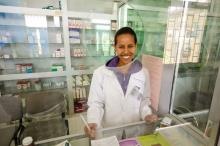
Welcome to PSS 101 Course
We are so glad that you have landed on the PSS 101 Course page! The course is an introductory level course that would be of benefit to anyone who works with medical products (drugs, vaccines, diagnostics or other devices, supplies etc.) and public health programs that rely on them or who is responsible for strengthening related systems (including regulation, pharmacy practices, financing and priority setting, information systems, and appropriate medicine use).
The purpose of the pharmaceutical systems strengthening (PSS) course is to teach participants the basic principles of PSS, including how addressing pharmaceutical system problems advance universal health coverage; combat antimicrobial resistance, HIV and AIDS, malaria, TB, and other public health threats; and promote maternal and child health.
Related courses are available on GHeL as part of the Pharmaceutical Systems Strengthening certificate. Two additional free online courses developed with USAID support are also available: 1) Foundations of Good Manufacturing Practices and 2) Medical Devices and Classifications: Focus on Maternal Neonatal and Child Health. This course and others are also offered in French. Simply use the Language dropdown in the top right corner of the page to select French when you land on the course you want.
Why is Pharmaceutical Strengthening (PSS) important?
Medical products and related pharmaceutical services that ensure their appropriate use play a critical role in determining health outcomes. However, challenges common in low- and middle-income countries, such as high out-of-pocket expenses and substandard and falsified products, gravely hamper the success of treatments for common diseases. Access to safe and quality products at an affordable price, and their effective use, can help countries prevent maternal and child deaths, create an AIDS-free generation, and protect their communities from infectious diseases, including drug resistance.
As indicated by the US Agency for International Development (USAID), strong pharmaceutical systems are necessary for high-quality health services. However, mismanagement and inappropriate usage are common. An estimated half of all medicines are prescribed, dispensed, sold, or taken inappropriately, and many are of poor quality. Such pharmaceutical systems issues can accelerate development and spread of drug resistance (HIV and AIDS, malaria, tuberculosis) and antimicrobial resistance.
To support pharmacists and health professionals to build their skills and better understand how the complex, comprehensive pharmaceutical system functions, the USAID-funded Medicines, Technologies, and Pharmaceutical Services (MTaPS) Program in collaboration wih Promoting the Quality of Medicines Plus (PQM+) Program developed this course with a series of hands-on e-learning modules.
E-Learning Modules
The course has eleven interactive modules addressing various aspects of the pharmaceutical system. Each module listed below is designed based on adult learning principles, case studies and/or success stories, links to glossary terms, and related resources.
- Module 1: Introduction - Improving access to and appropriate use of medical products and pharmaceutical services
- Module 2: Overview of pharmaceutical systems and pharmaceutical systems strengthening
- Module 3: Bolstering governance in pharmaceutical systems
- Module 4: Improving health outcomes through strengthening pharmaceutical financing systems
- Module 5: Information systems and data
- Module 6: Regulatory systems, PSS, and public health
- Module 7: Supply chain management in the context of PSS and UHC
- Module 8: Ensuring PSS through human resources capacity building
- Module 9: Medical products quality assurance at the global and country levels
- Module 10: Combatting Antimicrobial Resistance
- Module 11: Summary module: PSS 101 video
Objective
Participants who complete the course should be able to:
- Identify what a country pharmaceutical system is, how it relates to the supply chain system, and how it impacts the broader health system (in terms of service quality, coverage equity, and financial protection/resource optimization) as well as improved health outcomes.
- Demonstrate how USAID’s pharmaceutical systems strengthening approach can lead to more sustainable improvements in medicines access and appropriate use to achieve expected health outcomes.
- Explain how the problem can be better understood by looking at the underlying factors contributing to the problem, and how those factors may be linked to one or more pharmaceutical system and/or health system function.
- Compare alternative strategies for interventions to counter problems of the pharmaceutical systems in similar contexts, taking into account the local situation, political and regulatory considerations, feasibility of implementation, and the resources available.
- Identify methods and tools for evaluating pharmaceutical systems to ensure that the expected outcomes have been achieved.
- Identify specific pharmaceutical system weaknesses in USAID-supported countries that have an impact on USAID’s health goals.
- Identify the effect of antimicrobial resistance (AMR) on the health system and demonstrate base knowledge of strategies against AMR.
Credits
This course was developed by the USAID-funded Medicines, Technologies, and Pharmaceutical Services (MTaPS) Program, Promoting the Quality of Medicines Plus (PQM+) Program, and the USAID Office of Health Systems.
Time
- 2 hours
Published/Updated
- Tuesday, February 13, 2024
Course Authors:
Medicines, Technologies and Pharmaceutical Services (MTaPS) program:
-- Javier Guzman, Technical Director
-- Abibata Handley, Senior Technical Advisor
-- Francis (Kofi) Aboagye-Nyame, Program Director
-- Helena Walkowiak, Principal Technical Advisor
-- Emmanuel Nfor, Deputy Director
-- Kate Kikule, Principal Technical Advisor
-- Niranjan Konduri, Technical Director
-- Kwesi Eghan, Senior Technical Advisor
-- Andrew Brown, Senior Principal Technical Advisor
Promoting the Quality of Medicines Plus (PQM+) program:
-- Jude Nwokike, Vice President, PQM+
-- Leslie Rider-Araki, Monitoring, Evaluation and Learning Director
-- Souly Phanouvong, Director, Technical Programs
-- Gabriel Kaddu, Senior Technical Advisor
-- Ellie Bahirai, Director, Health Elements
Course Managers:
- Andrew Brown, Senior Technical Advisor for Governance and Capacity Building
- Emmanuel Nfor, Technical Director
